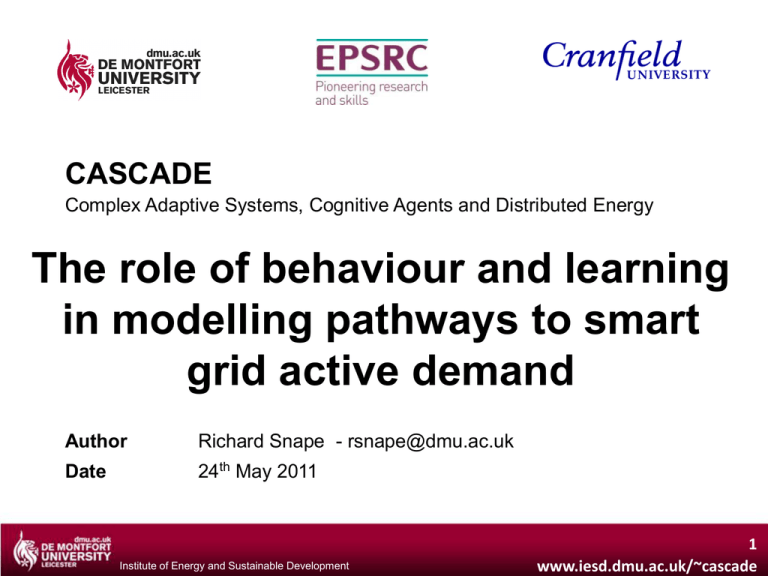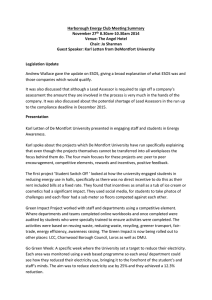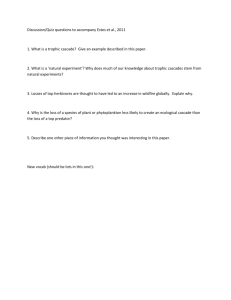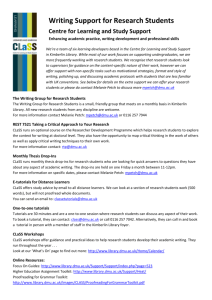
CASCADE
Complex Adaptive Systems, Cognitive Agents and Distributed Energy
The role of behaviour and learning
in modelling pathways to smart
grid active demand
Author
Richard Snape - rsnape@dmu.ac.uk
Date
24th May 2011
Institute of Energy and Sustainable Development
1
www.iesd.dmu.ac.uk/~cascade
The Smart Grid
Bidirectional power flow
Bidirectional information flow
€, £, $
Image: Copyright 2006 by Hawaiian Electric Company, Inc., all rights reserved
Institute of Energy and Sustainable Development
2
www.iesd.dmu.ac.uk/~cascade
Why the Smart Grid?
• Climate change objectives
• Energy security
• Avoidance of investment in
(unnecessary?) infrastructure
Institute of Energy and Sustainable Development
3
www.iesd.dmu.ac.uk/~cascade
Key component – active demand
Energy Deficiency
Supply
Demand
Power
Surplus Energy
Daily Time Cycle
Institute of Energy and Sustainable Development
4
www.iesd.dmu.ac.uk/~cascade
Pathways to Smart Grid?
• Unclear
• Many future scenarios e.g. LENS
scenarios (Ofgem, 2008),
• Routemap produced for government (ENSG,
2010)
• Smart Meters (enabling technology) will be
installed (e.g. DECC, 2010)
• Model needed
Institute of Energy and Sustainable Development
5
www.iesd.dmu.ac.uk/~cascade
Modelling approach
Agent Based Model chosen
Suitable for a Socio-Technical System with
Heterogeneous agents
Complex interactions
Multiple networks (social, communications, physical)
Investigating emergent patterns and
practices
Institute of Energy and Sustainable Development
6
www.iesd.dmu.ac.uk/~cascade
PhD focus
What type of learning / behaviour model is
appropriate to represent individuals, firms
and automata as agents in the model
Prototype concerned with individuals as
household decision makers
Exploring the effect of different learning
representations on potential for active
demand
Institute of Energy and Sustainable Development
7
www.iesd.dmu.ac.uk/~cascade
Learning agents in an ABM
Options:
Zero learning
Computationally lightweight – still have interesting results
Basic learning
Individual – e.g. rational choice or reinforcement
Advanced learning
Individual and / or social; “Rich” modelling of cognitive processes
Computationally expensive
Institute of Energy and Sustainable Development
8
www.iesd.dmu.ac.uk/~cascade
Social learning
Two schools of thought:
Social Cognitive Theory - learning from
observation of others’ behaviour and
outcomes (Bandura, 1985)
Communities of Practice - acquisition of
knowledge as a social process using concepts
of situated learning (Lave & Wenger, 1991; Wenger,
1998; Wenger 2007)
Institute of Energy and Sustainable Development
9
www.iesd.dmu.ac.uk/~cascade
Model runs
Pre-seed the agents with consumption practices or
“Energy cultures” (Stephenson, 2010)
Overlay social networks on the physical and
economic supplier / consumer network
Observe emergent pathways that occur with greater
probability over many runs
Analyse these more likely pathways in light of the
behaviour and learning representation used and
currently proposed future scenarios and policy
Institute of Energy and Sustainable Development
10
www.iesd.dmu.ac.uk/~cascade
Any questions or
comments?
For further information see
www.iesd.dmu.ac.uk/~cascade
Institute of Energy and Sustainable Development
11
www.iesd.dmu.ac.uk/~cascade
References
ENSG (2010) Electricity Networks Strategy Group - A Smart
Grid Routemap. United Kingdom
Ofgem (2008) Long-Term Electricity Network Scenarios
(LENS) - final report. Available from:
<http://www.ofgem.gov.uk/Pages/MoreInformation.aspx?
docid=5&refer=Networks/Trans/Archive/ElecTrans/LENS>
[Accessed 1 July 2011].
DECC (2010) Smart Metering implementation programme:
prospectus - Department of Energy and Climate Change
[Internet]. Available from:
<http://www.decc.gov.uk/en/content/cms/consultations/s
mart_mtr_imp/smart_mtr_imp.aspx> [Accessed 1 July
2011].
Thøgersen, J. & Grønhøj, A. (2010) Electricity saving in
households--A social cognitive approach. Energy Policy,
38 (12), pp.7732-7743.
Zhang, T. & Nuttall, W.J. (2011) Evaluating Government's
Policies on Promoting Smart Metering Diffusion in Retail
Electricity Markets via Agent-Based Simulation. Journal
of Product Innovation Management, 28 (2), pp.169-186.
Verbong, G.P.J. & Geels, F.W. (2010) Exploring
sustainability transitions in the electricity sector with
socio-technical pathways. Technological Forecasting and
Social Change, 77 (8), p.pp.1214-1221.
Bandura, A. (1986) Social foundations of thought and
action. Stanford University, Prentice-Hall, Inc., Eaglewood
Cliffs, New Jersey.
Lave, J. & Wenger, E. (1991) Situated learning: Legitimate
peripheral participation. Cambridge University Press.
Wenger, E. (1998) Communities of practice: Learning,
meanings, and identity. Cambridge university press.
Institute of Energy and Sustainable Development
12
www.iesd.dmu.ac.uk/~cascade
Bibliography
Learning
Behavioural theories
Roth, A.E. & Erev, I. (1995) Learning in extensive-form
games: Experimental data and simple dynamic models in
the intermediate term*. Games and Economic Behavior, 8
(1), pp.164-212.
Ajzen, I. (1991) The theory of planned behavior.
Organizational behavior and human decision processes,
50 (2), pp.179-211.
Sutton, R. & Barto, A. (1998) Reinforcement Learning: An
Introduction. Cambridge, MA, MIT Press.
Argyris, C. & Schon, D.A. (1996) Organizational learning II:
Theory, method and practice. Reading MA, AddisonWellesley
March, J.G. (1991) Exploration and exploitation in
organizational learning. Organization science, 2 (1), pp.7187.
Vriend, N.J. (2000) An illustration of the essential
difference between individual and social learning, and its
consequences for computational analyses. Journal of
Economic Dynamics and Control, 24 (1), pp.1-19.
Institute of Energy and Sustainable Development
Stern, P.C. (2000) New environmental theories: toward a
coherent theory of environmentally significant behavior.
Journal of social issues, 56 (3), pp.407-424.
Triandis, H.C. (1977) Interpersonal behavior. Monterey,
Brooks/Cole Pub. Co.
13
www.iesd.dmu.ac.uk/~cascade
Prototype results (1 year run)
Scenario 1
Scenario 3
Institute of Energy and Sustainable Development
Scenario 2
Scenario 4
14
www.iesd.dmu.ac.uk/~cascade



